Basic new contents of the Law on Organization of People’s Procuracies 2014 of Vietnam
On the basis of institutionalizing the party's judicial reform policies and concretizing the provisions of the Constitution 2013, the Law on Organization of People’s Procuracies 2014 of Vietnam has made new progress in legislative techniques, comprehensively regulating basic issues on the organization and operation of the People's Procuracy on the basis of codification of current Law documents, Ordinances and many regulations of sub-law documents, overcome the situation of many scattered, overlapping, and duplicate documents with procedural laws, ensuring the consistency and stability of the legal system; improve the legal effect of legal provisions.
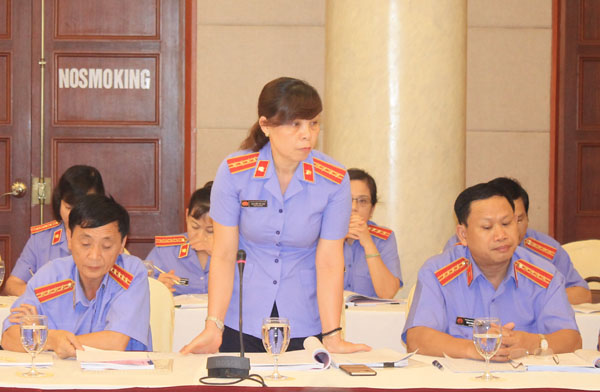
1. Regarding the position and role of the People's Procuracy in the organization and exercise of state power.
The Law on Organization of People’s Procuracies 2014 of Vietnam clearly affirms the legal status of the People's Procuracy as a constitutional institution in the state apparatus, with the function of exercising the power to prosecute and supervise judicial activities, which have the duty to safeguard the Constitution and law, human rights, citizens’ rights (Article 2).
The Law has clarified the position and role of the People's Procuracy in the relationship of assignment, coordination and control of state power according to the ideology of the Constitution 2013. With the function of exercising prosecutorial power and supervising judicial activities, the People's Procuracy is defined as an institution controlling judicial activities, responsible for coordinating, concurrently, closely and regularly supervising investigation agencies, courts, judgment enforcement agencies and other agencies in carrying out judicial activities. On the other hand, the law also clearly stipulates mechanisms to monitor the activities of the People's Procuracy through representative democratic institutions (such as the National Assembly and National Assembly agencies, deputies and delegations, People’s Councils and People’s Council deputies), through direct democracy and socio-political organizations (Clause 1 Article 9 and Article 10); concurrently, the law stipulates the return control mechanism of investigation agencies, courts, judgment enforcement agencies and other agencies with authority in judicial activities for carrying out the function of exercising the right to prosecute and supervise judicial activities of the People's Procuracy (Clause 2 Article 9).
2. Regarding the functions, tasks, and fields of work of the People's Procuracy
The Law on Organization of People’s Procuracies 2014 of Vietnam has contributed to perfecting the theoretical system on the functions and tasks of the People's Procuracy, ensuring consistency in awareness and practical activities, create a favorable legal basis for the development of laws related to the organization and operation of the People's Procuracy in the coming time such as the Law on Organization of Criminal Investigation Agencies, Criminal Procedure Code, Civil Procedure Code etc.
- The Law on Organization of People’s Procuracies 2014 of Vietnam clearly stipulates the scope, content, and purpose of the function of exercising prosecutorial power, affirming that the People's Procuracy exercises prosecutorial power right from the time of resolving denunciations, information about crimes, recommendations for prosecution and throughout the process of investigation, prosecution and trial of criminal cases. For the first time, the Law stipulates a separate section on the work of "Exercising the right to prosecute, supervise the handling of denunciations, crime reports, and recommendations for prosecution" to affirm that this is the field of work that carries out the independent function of the People's Procuracy (Section 1, Chapter II). Institutionalize the policy of Resolution 49-NQ/TW "strengthening prosecutorial responsibility in investigation activities, linking prosecution with investigation", the Law has defined the role and responsibility of the Procuracy as to decide on, or approve, the application, change or cancellation of measures restricting human rights or citizens’ rights in the settlement of reports and information on crimes and recommendations for prosecution and in the laying of charges, investigation and prosecution; to directly settle reports and information on crimes and recommendations for prosecution; to conduct some investigating activities to clarify grounds for laying charges on offenders; to decide to prosecute or not to prosecute the accused.
- The Law on Organization of People’s Procuracies 2014 of Vietnam clearly stipulates the scope, content, and purposes of the function of supervising judicial activities. Supervising judicial activities means an activity of people’s procuracies to supervise the lawfulness of acts and decisions committed or made by agencies, organizations and individuals in judicial activities. The supervision of judicial activities shall be conducted right upon the receipt and settlement of reports and information on crimes and recommendations for prosecution and throughout the course of settlement of criminal cases; in the settlement of administrative cases, civil, marriage and family, business, commercial and labor cases and matters; in the execution of judgments and settlement of complaints and denunciations about judicial activities; and in other judicial activities in accordance with law.
- Based on the content of the function of exercising the power to prosecute and supervise judicial activities, the Law on Organization of People’s Procuracies 2014 of Vietnam clearly stipulates the areas of work within the function of supervising judicial activities; clarifies the content of the stages of performing functions and supplement regulations on tasks serving the performance of functions of the People's Procuracy (Chapter II).
- The Law on Organization of People’s Procuracies 2014 of Vietnam has delineated cases where the People's Procuracy exercises the right to protest or petition; concurrently, this Law clearly stipulate the responsibilities and obligations of agencies, organizations and individuals in resolving and responding to protests and recommendations of the People's Procuracy, ensuring effectiveness and efficiency when the People's Procuracy exercises these rights in practice (Article 5).
- The Law on Organization of People’s Procuracies 2014 of Vietnam has expanded the authority of the Investigation Agency of the People's Procuracy both in terms of the type of crime and the subject committing the crime. According to Article 20 of this Law, investigating agencies of the Supreme People’s Procuracy and the Central Military Procuracy shall investigate crimes of infringing upon judicial activities and corruption- and position-related crimes committed in judicial activities by cadres or civil servants of investigating agencies, courts, people’s procuracies or judgment enforcement agencies or persons competent to conduct judicial activities in accordance with law.
3. Principles on organization and operation of people’s procuracies
The Law on Organization of People’s Procuracies 2014 of Vietnam has continued to affirm and clarify the content of the principle of "centralized and unified leadership in the Industry" by clarifying the relationship between the Chief Procurator of the People's Procuracy at a higher level and the Chief Procurator of the People's Procuracy at a lower level and vice versa through specific regulations on the duties and powers of the Chief Procurator of the People's Procuracy at all levels (Articles 63, 65, 66, 67, 69, 70, 71).
Concurrently, this Law further clarifies the Constitution's provisions on principles when exercising the right to prosecute and supervise judicial activities, procurators shall comply with the law and are under the direction of the Chief Procurator of the People's Procuracy with the following contents: Procurators shall observe decisions of chief procurators of their people’s procuracies. When having grounds to believe that a decision of the chief procurator of his/her people’s procuracy is illegal, a procurator may refuse to perform the assigned duty and shall report such in writing to the chief procurator. In case the chief procurator determines to execute the decisions, he/she shall issue a written decision thereon and the procurator shall execute the decision but is not held responsible for any arising consequences and, at the same time, shall report the case to the chief procurator of the competent higher-level people’s procuracy. The chief procurator shall take responsibility before law for his/her decision (Clause 1 Article 83).
4. General regulations on organizational structure of the People's Procuracy
The Law on Organization of People’s Procuracies 2014 of Vietnam has renewed the People's Procuracy system under the jurisdiction of the Court, regardless of administrative units, creating a legal basis to build the organizational structure of the People's Procuracy at all levels in a specialized direction, meeting the requirements of expanding authority:
- The Law on Organization of People’s Procuracies 2014 of Vietnam established a four-level People's Procuracy organization system according to the judicial reform policy, including the Supreme People's Procuracy, Superior people’s procuracies, People’s procuracies of provinces and central-affiliated cities, People’s procuracies of rural districts, urban districts, towns, provincial cities and the equivalent (Article 40); supplemented regulation on delineating the scope of authority of the four levels of People's Procuracy (Article 41).
- Regarding the organizational structure of the People's Procuracy at all levels (Articles 42, 44, 46, 48), the law has amended the way of regulations to ensure coverage of all types of units at all levels of the Procuracy.
Regarding the staff structure, the Law fully and comprehensively regulates procedural positions and other legal positions of each level of the Procuracy, specifically: (1) Regulations on additional positions of Inspector, other officials and other employees in the staff structure of People's Procuracy at all levels; (2) For regulations on the staff structure of the Supreme People's Procuracy and the Central Military Procuracy, there are additional positions of the Investigation Agency; (3) Supplementing regulations on public employees in the staff structure of the Supreme People's Procuracy because the Supreme People's Procuracy has public service units; (4) Particularly for Military Procuracy at all levels, in addition to regulating the additional position of Inspector, there are also regulations on other military personnel, civil servants, public employees and other workers to ensure compliance with the specific organization and staff of the army.
- Establishment of the Superior People's Procuracy as a new level of procuracy, with the task of exercising the power to prosecute and supervise judicial activities related to cases and matters falling under the jurisdiction of superior people’s courts (Clause 1 Article 41). Therefore, the units that exercise the power of prosecution and trial in the Superior People's Procuracy are organized into "Institutes" to ensure correspondence with the specialized courts of the Superior People's Court (Article 45). Besides, a superior people’s procuracy has its chief procurator, deputy chief procurators, procurators, examiners, civil servants and other employees (Article 44).
According to Clauses 2, 3 and 4 Article 2 of Resolution No. 82/2014/QH13 on implementation of the Law on Organization of People’s Procuracies 2014, from June 01, 2015, the Supreme People's Procuracy will transfer the tasks of exercising prosecutorial power and supervising appellate trials to the Superior People's Procuracy; The Provincial People's Procuracy will transfer the tasks of exercising the right to prosecute, supervise cassation and retrial trials to the Superior People's Procuracy for the Superior People's Procuracy to begin performing the duties and powers of an independent procuracy level in the People's Procuracy system.
- The law also consolidated the organizational structure of the district-level People's Procuracy towards the organization of "Office and Divisions". The establishment of department-level units at the district-level People's Procuracy has increased the efficiency of management and administration; ensure specialization, consistent with the establishment of specialized courts of district-level People's Courts. However, for district-level People's Procuracy that does not have enough conditions to establish departments (in mountainous areas, islands, with little workload), the current model of working departments and supporting apparatus remains intact. Such an organization is both flexible and consistent with the practical implementation of functions and tasks of each district-level People's Procuracy (Clause 1 Article 48).
- Supervisory committees of people’s procuracies (Articles 43, 45, 47, 53, 55)
In addition to continuing to regulate the Procuracy Committee at the Supreme People's Procuracy, Provincial People's Procuracy, Central Military Procuracy, Military Procuracy of Military Regions and equivalents as at present, the Law on Organization of People’s Procuracies 2014 of Vietnam established an additional supervisory committee in the Superior People's Procuracy as a new level of procuracy.
The role of the Procuracy Committee in this Law is also renewed. The Law continues to stipulate that the Procuracy Committee has the right to decide on important issues about the organization and operation of the People's Procuracy as in the current Law. Particularly for criminal cases, administrative cases, and important civil cases, the Law does not assign the Procuracy Committee the right to make decisions as currently, but only has the role of advising the Director when the Director finds it necessary, ensuring compliance with the provisions of procedural laws on the conduct of proceedings and the principle of responsibility in judicial activities of the Chief Procurator of the People's Procuracy. This Law also adds authority to the Procuracy Committee to recruit qualified people to take the exam for the rank of prosecutor.
When deciding on issues assigned in the Law, the Procuracy Committee must issue resolutions based on the votes of the majority of the Procuracy Committee members.
- The Law has added regulations on the authority to establish and dissolve the People's Procuracy (Article 49). The establishment and dissolution of the Superior People's Procuracy, Provincial People's Procuracy, and District People's Procuracy are decided by the National Assembly Standing Committee at the request of the Director of the Supreme People's Procuracy.
5. Officials, public employees and other employees of People’s Procuracies
a) The Law has developed a separate section (Section 1 Chapter IV) regulating general issues regarding officials, public employees and other employees of People’s Procuracies, including the following new points:
- For the first time, the judicial positions of the People's Procuracy are clearly defined. In addition to judicial positions, in the People's Procuracy there are also other officials, public employees and other employees; In the Military Procuracy, there are also other military personnel (Article 58).
- Regulating the general responsibilities of officials, public employees and other employees of People’s Procuracies, instead of only stipulating the responsibilities of judicial positions as before (Article 59).
- Amending and supplementing regulations on mobilization, rotation, and secondment of officials and public employees of the People's Procuracy (Article 60): (1) Correctly redefine the concepts and cases of "secondment" and "rotation"; (2) Regulations on decentralization for Commanders of military zones and equivalent levels in the mobilization and rotation of Procurators, Inspectors, and other military personnel, officials and public employees between Military Procuracy under military zones and equivalents to suit the current practice of mobilizing and rotating officials in the Army.
- Regarding the responsibilities of the Procurator General of the People's Procuracy in managing officials, public employees and other employees of (Article 61), the Law specifically stipulates the responsibilities of the Chief Procurator of the Supreme People's Procuracy and the Chief Procurators of other Procuracy in personnel management. Instead of only regulating management, training and fostering responsibilities for officials and Procurators, the Law has expanded the scope and subjects; regulates the management of personnel work of the Sector, of all levels of the Procuracy and for all officials, public employees and other employees of the People's Procuracy.
b) The Law has developed a separate section (Section 2 Chapter IV) regulating the legal regime of the Chief Procurator of People's Procuracy at all levels. In particular, it has specifically supplemented and clearly defined the duties and powers of the Directors of People's Procuracy at all levels, thereby clarifying the relationship between the Procurator of the People's Procuracy at lower levels and the Procurator of the People's Procuracy at the upper level, between the Procurator of the People's Procuracy at the lower level and the Procurator of the Supreme People's Procuracy in accordance with the content and spirit of the principle of concentration and unification of leadership in the Industry.
The Law also more clearly stipulates that the duties and powers of the Deputy Director of the People's Procuracy are, according to the assignment or authorization of the Director, to perform other tasks and powers according to the provisions of law; concurrently, it clearly stipulates the responsibility of the Deputy Director of the People's Procuracy to be responsible before the Director and the law for the performance of his or her duties and powers.
c) Prosecutors
The legal regime of the Procuratorate has been fundamentally renewed, specifically as follows:
- 4 ranks of procurators of people’s procuracies include: Procurators of the Supreme People’s Procuracy; High-level procurators; Intermediate-level procurators; Primary-level procurators. High-level procurator is a new rank, for which the standards for appointing correspond to the current standards for appointing Procurators of the Supreme People's Procuracy; Diversify the ranks of Procurators at each level of the Procuracy to ensure flexibility in using, arranging, mobilizing and rotating staff between levels of the Procuracy, meet the requirements for performing tasks of each level (Articles 76, 79).
- Regulating that the number of procurators of the Supreme People’s Procuracy must not exceed 19 (Clause 1 Article 93); improving standards for appointing Procurators of the Supreme People's Procuracy (Article 80).
- Innovating regulation on term of office of procurators, according to which the initial term of office of procurator is 5 years, for procurators who are reappointed or entitled to rank promotion, the subsequent term of office is 10 years( Article 82).
- Apply the form of entrance exam for the ranks of primary, intermediate, and senior Procurators; The Procuracy Committee reviews and selects qualified candidates to take the exam; Supplementing regulations on the Examination Council for the above mentioned Procurator ranks (Article 87). For Procurators of the Supreme People's Procuracy, continue to implement the selection mechanism through the Selection Council as currently.
- Supplementing regulations on the oath of Procurators upon appointment (Article 85).
d) Inspectors
For the first time, the Law on Organization of People’s Procuracies 2014 of Vietnam recognizes Inspector as a judicial position for the first time, appointed to help the Procurator exercise the right to prosecute, supervise judicial activities and perform other tasks and powers as assigned by the Director. 03 inspector ranks include examiners, principal examiners; senior examiners. The appointment criteria and conditions for promotion to the rank of Inspector are prescribed by the National Assembly Standing Committee (Article 90).
6. Regarding conditions to ensure the operation of the People's Procuracy
Regulations on ensuring the operation of the People's Procuracy have the following new points:
- The law has added regulations on traditional days and badges of the Procuracy sector (Article 11).
- Assign the Director of the Supreme People's Procuracy the right to propose to the National Assembly to consider and decide on the operating budget estimate of the People's Procuracy in case the Government and the Supreme People's Procuracy do not agree on the estimate (Clause 2 Article 94);
- Innovate the mechanism for submitting operating costs of the Procuracy to suit reality, accordingly, the operating budget of the Military Procuracy is estimated by the Director of the Central Military Procuracy and reported to the Ministry of National Defense to propose to the Government to submit to the National Assembly for decision (Clause 3 Article 94);
- Regulate issues where the state prioritizes investment in the People's Procuracy to ensure the construction of physical foundations for judicial activities, accordingly, the State shall prioritize investment in building of working offices and procurement of equipment to improve operation capacity for people’s procuracies. Working offices, equipment and working devices of military procuracies shall be guaranteed by the Government at the proposal of the Minister of National Defense (Clause 4 Article 94);
- Regulate that judicial positions have their own salary scales and grades; allowances (Articles 95, 96);
- Supplement regulations on commendation and handling of violations (Article 99).
Source: vksnd.laocai.gov.vn
- 04 regulations to know about the safety assessment of construction works in Vietnam
- Contents on signboards installed at new construction sites in Vietnam
- 06 professional responsibilities of pharmaceutical practitioners in Vietnam
- Places for submitting dossier for personal income tax finalization in Vietnam in 2025
- Regulations on direct and authorized settlement of personal income tax in Vietnam in 2025
- Schedule for submitting tax declarations for 4th quarter of 2024 in Vietnam
-
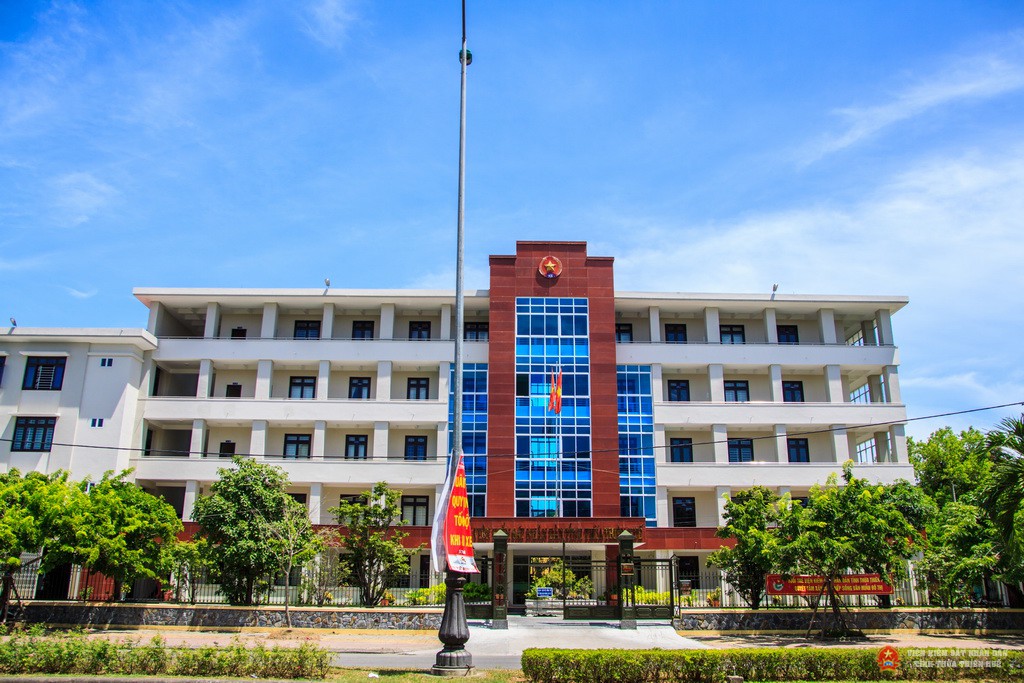
- Assurance of operation of people’s procuracies ...
- 08:30, 17/10/2023
-
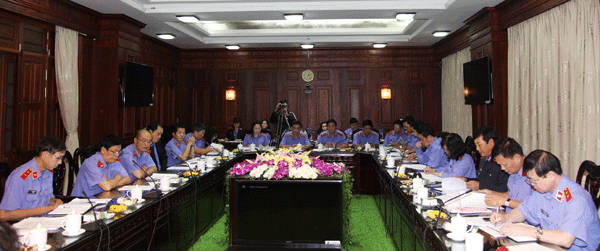
- The Procuracy's right to protest and recommend ...
- 11:59, 12/12/2017
-
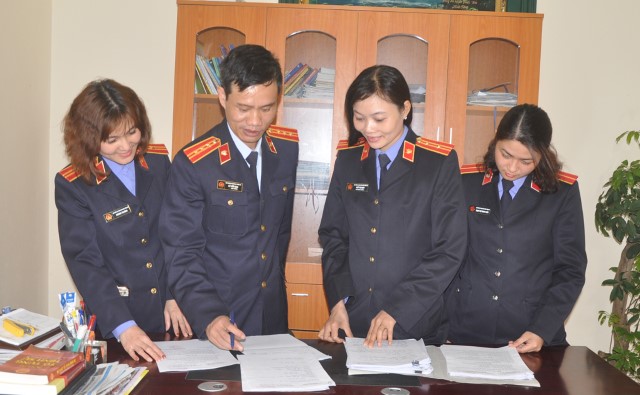
- Vietnam: Duties and powers of people’s procuracies ...
- 08:03, 25/05/2017
-
.jpg)
- Some main contents and new points of the Law on ...
- 15:40, 20/05/2017
-
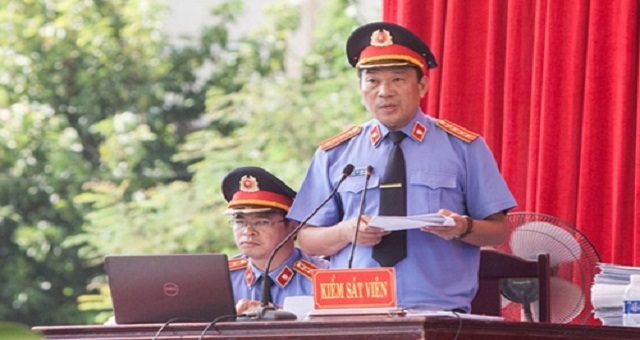
- Exercising the power to prosecute: Basic function ...
- 16:32, 30/12/2016
-
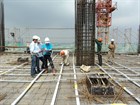
- 04 regulations to know about the safety assessment ...
- 11:59, 31/01/2025
-

- Contents on signboards installed at new construction ...
- 11:59, 30/01/2025
-

- Contents of the estimated norms for digging and ...
- 08:00, 30/01/2025
-

- 06 professional responsibilities of pharmaceutical ...
- 11:59, 29/01/2025
-

- Places for submitting dossier for personal income ...
- 11:59, 28/01/2025
 Article table of contents
Article table of contents
